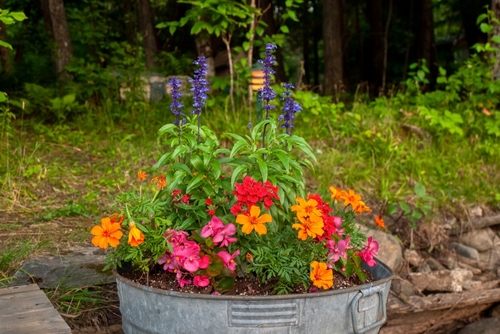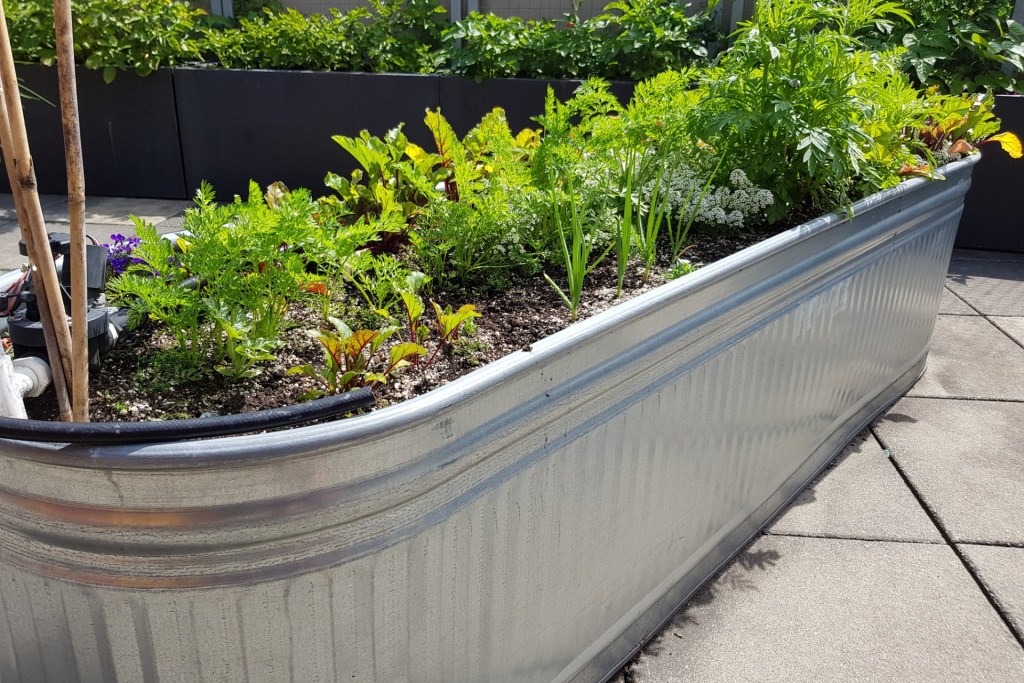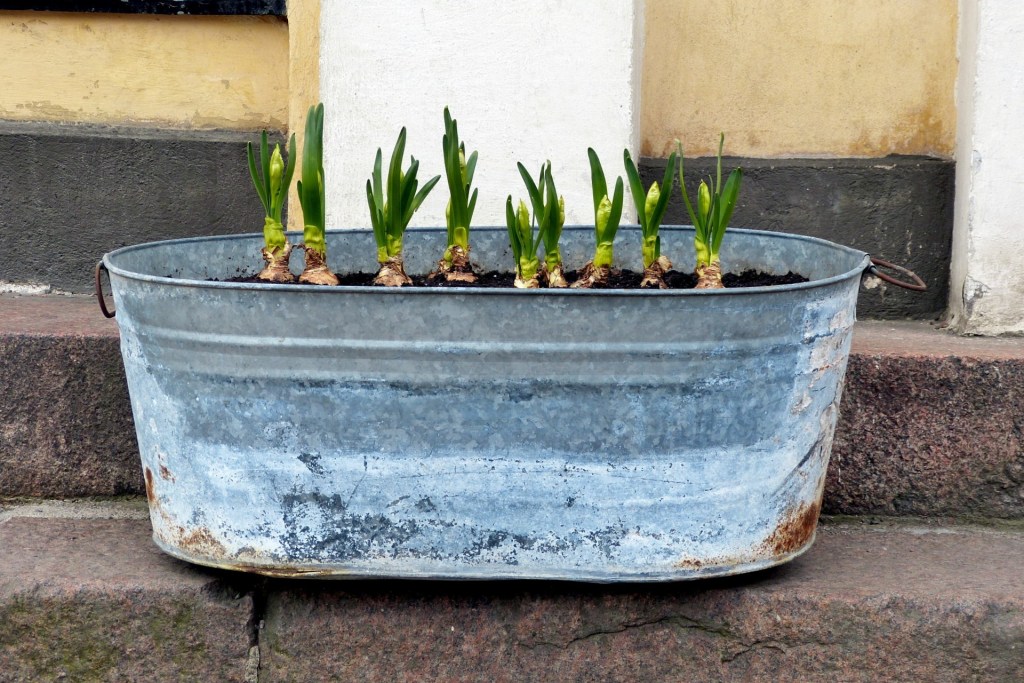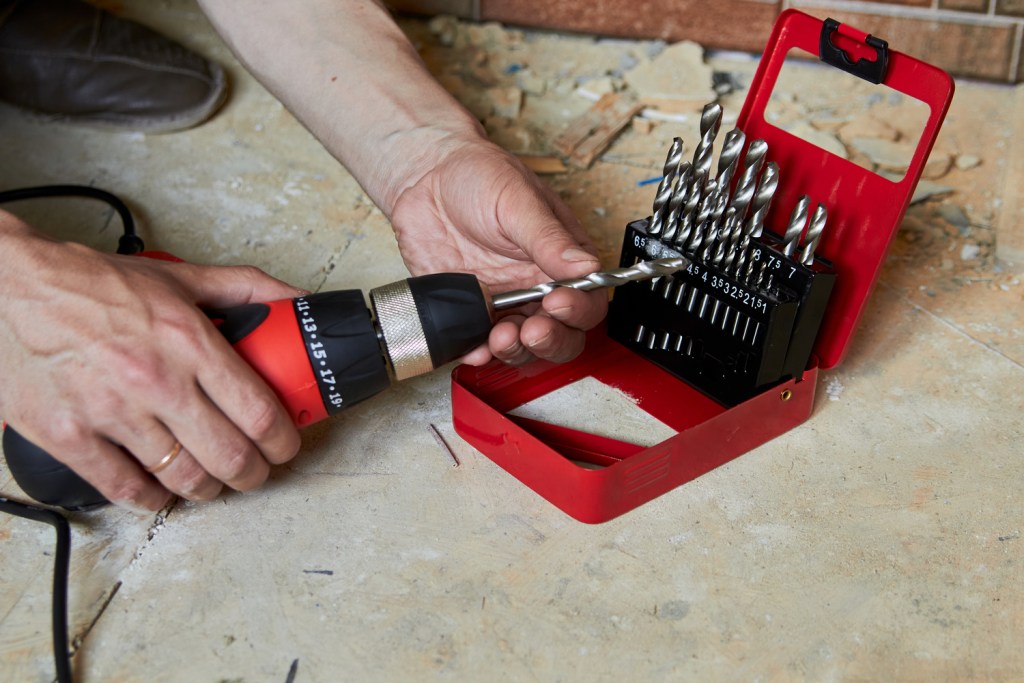
Water trough gardening has been a rising trend in the green thumb community. There is no one-size-fits-all method to achieving a beautiful garden: Some gardeners create gorgeous vertical gardens, some prefer pyramid gardens, while others would rather start a hydroponic garden. But water trough gardening is unique because it typically uses steel or other metal and is often used to provide fresh, clean water to livestock on farms or ranches.
If you are looking to achieve a rustic yet modern look in your garden, a water trough planter can be the perfect vessel to hold your plants. Here are the pros and cons of water trough gardening so you can determine whether it’s the best gardening method for you and your space.

Pros of water trough gardening
Water trough gardening is essentially using water troughs as a planter. There can be many great benefits to utilizing a water trough in your garden. If you have an old one lying around or just found one at a garage sale, you can use it to make some stunning garden beds for whatever you want to plant.
“Water troughs in the garden are a handy way to reduce weeding, increase your gardening area, and help you avoid burrowing animals,” said Southeast Ag NET.
These are some of the main pros to starting your own water trough garden:
- They’re already assembled. Once you buy a water trough, that is what you have. There is no assembly required. All you have to do is fill your water trough with soil, plants, and some water, and you’re on your way to a beautiful and flourishing garden.
- They’re durable. Water troughs were designed to provide water to livestock such as cows, pigs, and goats. They are built to be tough, so you never have to worry about your garden falling apart.
- Affordable and versatile design. Water troughs are typically affordable and can be used and reused for a variety of things.
- Can help keep away underground pests. Since your plants are raised up and off the ground, you don’t have to worry about underground wildlife like groundhogs or rabbits getting to your plants. This is especially helpful when growing vegetables or berries.
- Easy to locate and buy. Water troughs can be found online, at your local home improvement store, or at a farm supply shop. They are affordable and easy to find, so you can get your garden started quickly and easily.
- Promotes strong root growth. Since these troughs were designed to hold many gallons of water, they are made deep and wide. This type of potting environment is perfect for ensuring that your plants’ roots won’t ever be restricted.
- Makes your garden more accessible. Water troughs are tall items, so the top stays high up off the ground. This makes gardening a lot more accessible for those who have knee or back problems because you don’t have to kneel or bend over to harvest or care for your plants.
- Can be painted for a pop of color. You can give the water trough a fresh coat of paint and even design pictures and patterns on it. This way, your flowers won’t be the only beautiful artwork in your yard.
- Tend to get fewer weeds or no weeds. Since your flowers or plants are contained in one consolidated area, there is a smaller risk of weeds growing. If weeds do grow, you can pull them out quickly and easily.
- Ideal for areas with poor soil. Just like any other pot, a water trough provides you with the opportunity to give your plants the best soil around. If you live in an area with poor soil quality, then a water trough can act as a great container for holding high-quality and store-bought soil for your plants.
- Great for small backyard spaces. Lastly, a water trough is great for a back deck, front porch, or small patio if you are lacking space to dig down into the ground and start your garden.

Cons of water trough gardening
Even though there are so many great advantages to having a water trough garden, it is important to consider the cons in order to determine if this garden is right for you:
- They’re heavy. Water troughs are typically made of steel or another metal, making them heavy and difficult to move around, especially when filled with soil.
- They absorb heat. The metal material of a water trough can heat up and be hot to the touch when left out in the sun. This could cause minor burns if touched accidentally.
- They dry out quickly. Just like any other potted plant, the soil in a water trough tends to dry out quickly, so you may need to water more often.
- They can crack from freezing cold temperatures. You’ll need to maintain the water trough over the winter months or store it safely and pour out any excess water before you use it.
- Concerns over galvanized water troughs leaking zinc.
- They rust. Also corrosion, but Go To Tanks explained how to maintain and check for other unwanted things.

How to turn a water trough into your garden
So you have your water trough — now what? First, drill holes into the bottom of the trough for water filtration. Using a 1/4 drill bit, space the holes about 6 to 8 inches apart, depending on the size of your trough. Next, it’s recommended to place the trough up on 1/2-inch wooden slats to improve drainage and also, so it’s not weighing directly on the surface of your deck or patio. Now it’s time to fill the trough with soil and plant away.
There are so many great benefits to water trough gardening. While the pros outweigh the cons, the cons are still important to consider. Gardeners do need to understand how heavy, hot, and dry a water trough garden can get and use the right methods and approaches for taking care of one.
Regardless of the cons, the many benefits of water trough gardening show that it can be a fun, beautiful, and sturdy addition to any outdoor space. You will love how functional, versatile, and practical a water trough garden can be in your yard.



